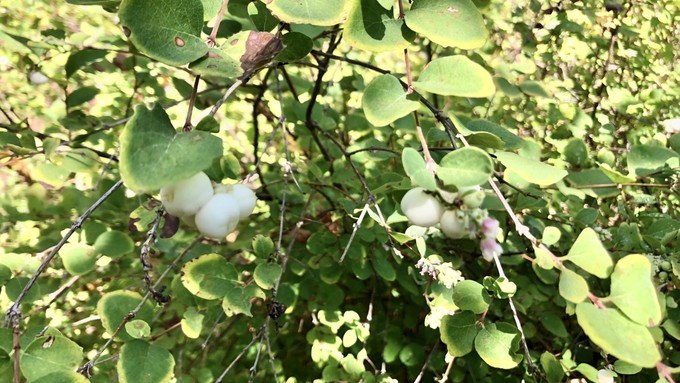
Find out farms’ sale includes some larger plants, too

The snowberry is a California native and will be among the tiny plants sold Saturday at find out farms. Kathy Morrison
Find out farms, an urban farm in South Oak Park, will hold a 'really big' sale of really small California native plants this Saturday, Nov. 12.
The farm's founder, Matthew J. Ampersand, typically sells plants every Saturday morning, but this "flash sale," he notes on Facebook, specifically features small starts that he'd rather sell than transplant to larger containers.
The tiny plants on sale will range from common yarrow and blue-eyed grass to California sagebrush and snowberry.
How tiny is tiny? The pots are 2-1/4 inches square by 3 inches deep, with "very affordable" prices.
"They're ready to be planted or potted up at the time of purchase," Ampersand posted on the Facebook page for the Sacramento Native Plants and Wildlife Gardening Group. "Our goal is to make these plants available to a wide variety of gardeners and to offer some less common species at a price that makes it feel safe to take a little risk."
Rain or shine, the sale will run from 9 a.m. to noon Saturday at the farm, 4712 Parker Ave., (Parker at Howard avenues), Sacramento
The sale will include some gallon-sized pots, too. There also will be a free seed swap box just for California native plants. And Hedgerow's Central Valley Pollinator Seed Mix also will be available for purchase.
For more on find out farms, including its community fruit gleaning project, visit its Facebook page or go to findoutfarms.com
Comments
0 comments have been posted.Sacramento Digs Gardening to your inbox.
Sites We Like
Garden Checklist for week of April 21
This week there’s plenty to keep gardeners busy. With no rain in the immediate forecast, remember to irrigate any new transplants.
* Weed, weed, weed! Get them before they flower and go to seed.
* April is the last chance to plant citrus trees such as dwarf orange, lemon and kumquat. These trees also look good in landscaping and provide fresh fruit in winter.
* Smell orange blossoms? Feed citrus trees with a low dose of balanced fertilizer (such as 10-10-10) during bloom to help set fruit. Keep an eye out for ants.
* Apply slow-release fertilizer to the lawn.
* Thoroughly clean debris from the bottom of outdoor ponds or fountains.
* Spring brings a flush of rapid growth, and that means your garden is really hungry. Feed shrubs and trees with a slow-release fertilizer. Or mulch with a 1-inch layer of compost.
* Azaleas and camellias looking a little yellow? If leaves are turning yellow between the veins, give them a boost with chelated iron.
* Trim dead flowers but not leaves from spring-flowering bulbs such as daffodils and tulips. Those leaves gather energy to create next year's flowers. Also, give the bulbs a fertilizer boost after bloom.
* Pinch chrysanthemums back to 12 inches for fall flowers. Cut old stems to the ground.
* Mulch around plants to conserve moisture and control weeds.
* From seed, plant beans, beets, cantaloupes, carrots, corn, cucumbers, melons, radishes and squash.
* Plant onion sets.
* In the flower garden, plant seeds for asters, cosmos, celosia, marigolds, salvia, sunflowers and zinnias.
* Transplant petunias, zinnias, geraniums and other summer bloomers.
* Plant perennials and dahlia tubers for summer bloom.
* Mid to late April is about the last chance to plant summer bulbs, such as gladiolus and tuberous begonias.
* Transplant lettuce seedlings. Choose varieties that mature quickly such as loose leaf.